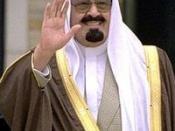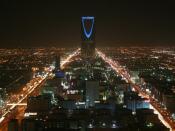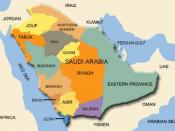Saudi Arabia, one of the most influential states in the Islamic world nowadays, is the motherland of Islamic religion. Two main sacred cities of Islam - Mecca and Medina - are situated on its land. Muslims from all over the world come here on pilgrimage. Furthermore, in the 1970s Saudi Arabia managed to gain quite significant positions in the Muslim world due to oil-dollars and suddenly appeared to be very powerful state, which all the Arab countries and the Muslim world as a whole were obliged to reckon with. This colossal economic power and the status of the chief and senior country of Islam are already enough to mark the Islamic component out as one of the leading ones in the foreign policy of the Kingdom.
However, numerous academic experts on Islam assent to Vatikiotis opinion that "during the last 150 years Islam as religion and law was consecutively expelled to a minimum role in economics, home and foreign policies" (Vatikiotis, P.J.,
1981, p.172). Arab analysts have also evaluated the role of Islam as not leading and moreover not even influential. Thus, Fuad As-Sayeg concluded that "Islam does not have any remarkable influence on motivation, planning and decision-making" by politicians of the Muslim states (Fuad As-Sayeg, 1992, p.36).
But it would be an underestimation to think that Islam has a minor role in Saudi Arabia's policies, since "its ideological values are derived from Islam as a basis and determine its features and priorities" (Fuad As-Sayeg, 1992, p.38). In other words, these value principles are instruments of realization of foreign policy.
The goals of this research are to reveal the degree of correlation of the Islamic and pragmatic components in Saudi Arabia's foreign policy and at the same time to reveal the degree of influence of Islam on Saudi foreign...


